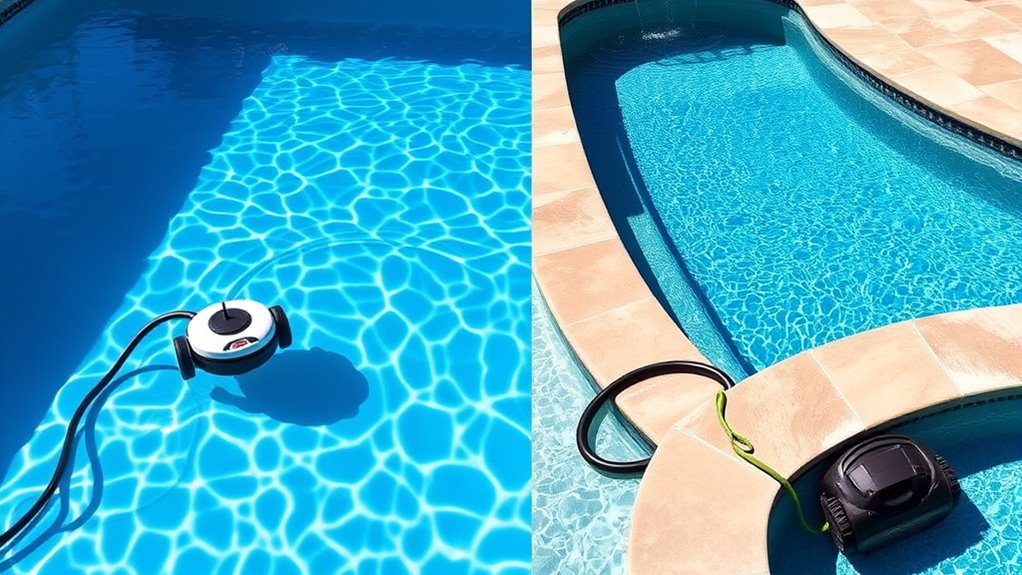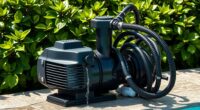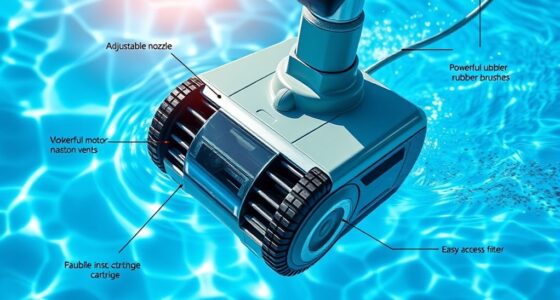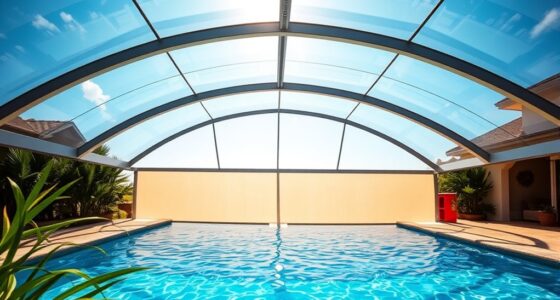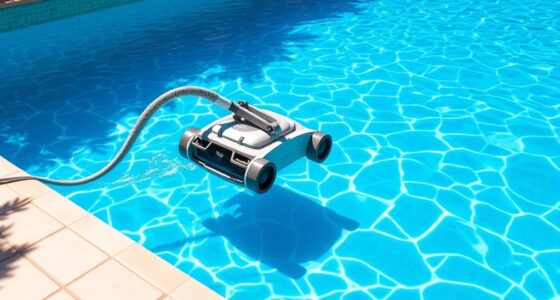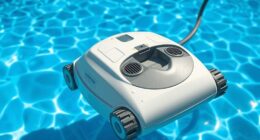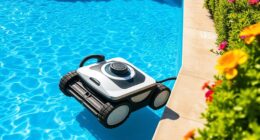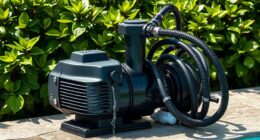Using suction pool cleaners in above-ground pools is straightforward because they connect easily and handle lighter debris, requiring less maintenance. In in-ground pools, they work well for routine cleaning but may need extra help with heavy dirt or corners. Proper installation, compatible equipment, and ongoing upkeep are essential in both pool types. To optimize performance and longevity, understanding these differences can help you get the most out of your cleaner—learn more as you continue.
Key Takeaways
- Suction cleaners are compatible with both above-ground and in-ground pools, but setup complexity varies.
- In-ground pools often require more secure fittings and modifications for optimal suction cleaner performance.
- Above-ground pools need less powerful pumps and simpler connections, making installation easier.
- Regular maintenance like filter cleaning and hose inspection is essential for both pool types.
- Heavy dirt or debris may require additional cleaning methods beyond suction cleaners in larger in-ground pools.
Differences in Pool Structures and Cleaning Needs
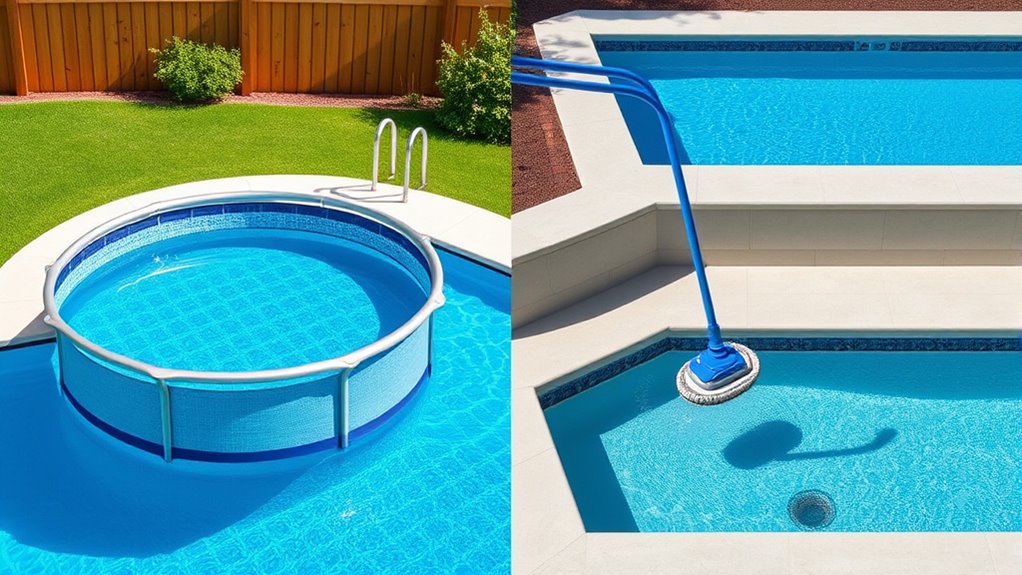
Pools come in various structures, each with unique cleaning requirements. For example, above-ground pools often have simpler designs and may use pool coverings to reduce debris buildup, making cleaning easier. In-ground pools, with their more extensive surfaces and complex shapes, demand more thorough cleaning routines. Water chemistry plays a crucial role in maintaining both types of pools; proper balance prevents algae growth and keeps the water clear. Suction pool cleaners work well for both, but the structure affects how you use and maintain them. Above-ground pools typically require less intensive cleaning, but regular attention to water chemistry and covering the pool when not in use is essential. In-ground pools may need more frequent cleaning, especially around tricky corners and edges, to keep everything clear and safe. Additionally, the pool structure influences the size and type of suction cleaner that is most effective for maintenance. Properly maintaining water chemistry and understanding the structure can help extend the lifespan of your cleaning equipment and improve overall pool health. Recognizing the differences in pool design can also help homeowners select the most suitable cleaning methods and equipment for their specific pool type.
Compatibility of Suction Cleaners With Above-Ground Pools
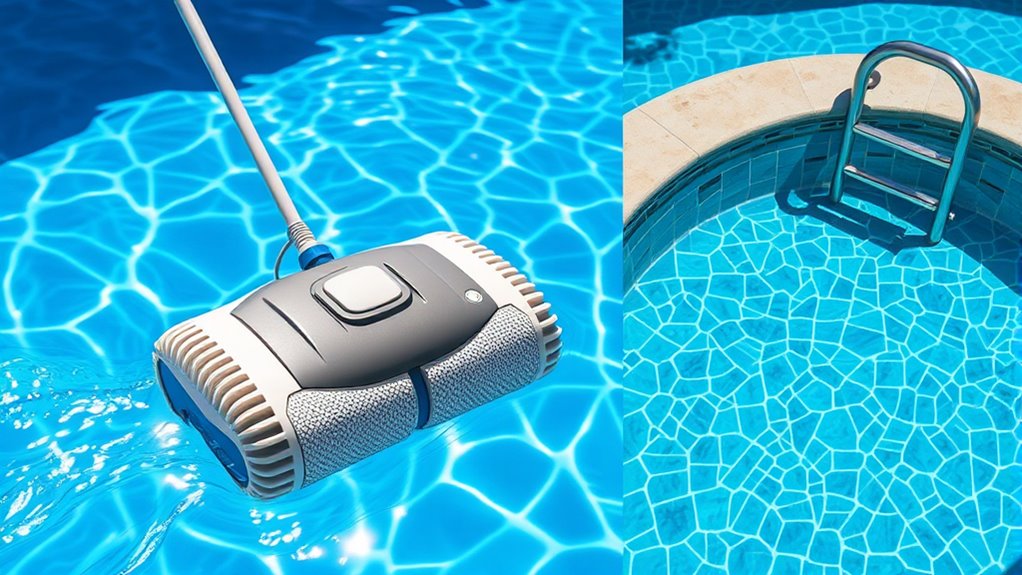
Suction pool cleaners are generally compatible with above-ground pools, making them a popular choice for maintenance. They can effectively handle debris, reducing the need for alternative cleaning methods. However, guarantee your pool’s pump and filter system can support their operation. Proper pool chemical balance is essential to prevent algae growth and maintain water clarity while using these cleaners. Consider these factors:
- Compatibility with your pool’s skimmer and return fittings.
- The size and shape of your above-ground pool.
- Adjustments needed to optimize suction and flow.
- Regular monitoring of pool chemical levels to prevent cloudiness.
Additionally, ensuring your pool’s filtration system is capable of handling increased debris collection will improve cleaning efficiency and prolong equipment lifespan. Maintaining the water chemistry appropriately will help prevent issues like algae buildup that can hinder cleaner performance. Being aware of the top-rated portable pool cleaners can help you select the most effective model for your specific pool type and size. Regular inspection of the pool pump capacity can also prevent potential issues with suction and cleaning efficacy. Moreover, understanding pool filtration systems and their capabilities will help optimize overall maintenance.
Effectiveness of Suction Cleaners in In-Ground Pools
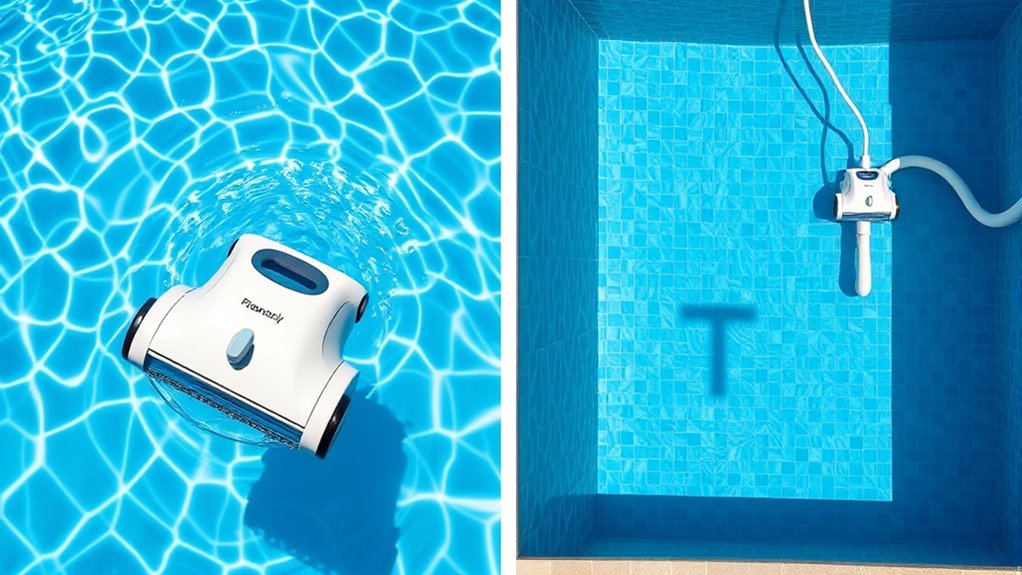
While suction pool cleaners are often praised for their simplicity and affordability, their effectiveness in in-ground pools depends on several key factors. These cleaners work well for routine debris removal but may struggle with heavy or complex dirt, making alternative cleaning methods like robotic cleaners or manual skimming necessary for thorough maintenance. Additionally, their performance can be affected by pool chemical compatibility; certain chemicals may clog filters or damage components, reducing efficiency. To maximize cleaning results, you should regularly monitor and maintain the cleaner, ensure proper suction pressure, and choose a model suited for your pool’s size and shape. Using diverse designs and materials can also influence the cleaner’s ability to adapt to different pool surfaces. Proper maintenance practices can significantly extend the lifespan and effectiveness of your suction cleaner, especially in in-ground pools. Moreover, selecting a tuning-compatible model that aligns with your pool’s specific requirements can enhance overall performance and longevity. Understanding these factors helps you decide whether suction cleaners meet your in-ground pool cleaning needs or if supplementing with other methods is necessary.
Installation and Setup Considerations for Each Pool Type
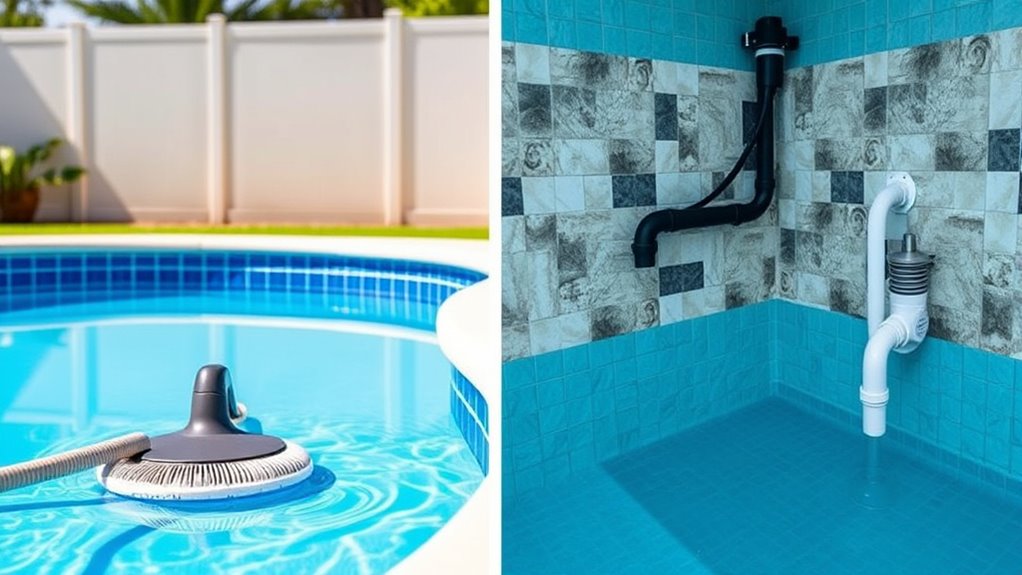
Choosing the right suction pool cleaner and setting it up properly depends heavily on your pool type. For in-ground pools, consider the pool design to guarantee proper hose length and placement, maximizing coverage and suction. Above-ground pools often need adapters or specialized fittings to connect the cleaner effectively. To maximize energy efficiency, verify that your pump’s flow rate matches the cleaner’s requirements.
Here are key setup considerations:
- Adjust the cleaner’s hose length for optimal movement.
- Ensure secure connections to prevent leaks.
- Use the correct fittings based on pool design.
- Monitor pump performance to avoid unnecessary energy use.
Proper installation ensures efficient cleaning, prolongs equipment life, and maintains overall pool performance.
Maintenance and Troubleshooting for Suction Pool Cleaners
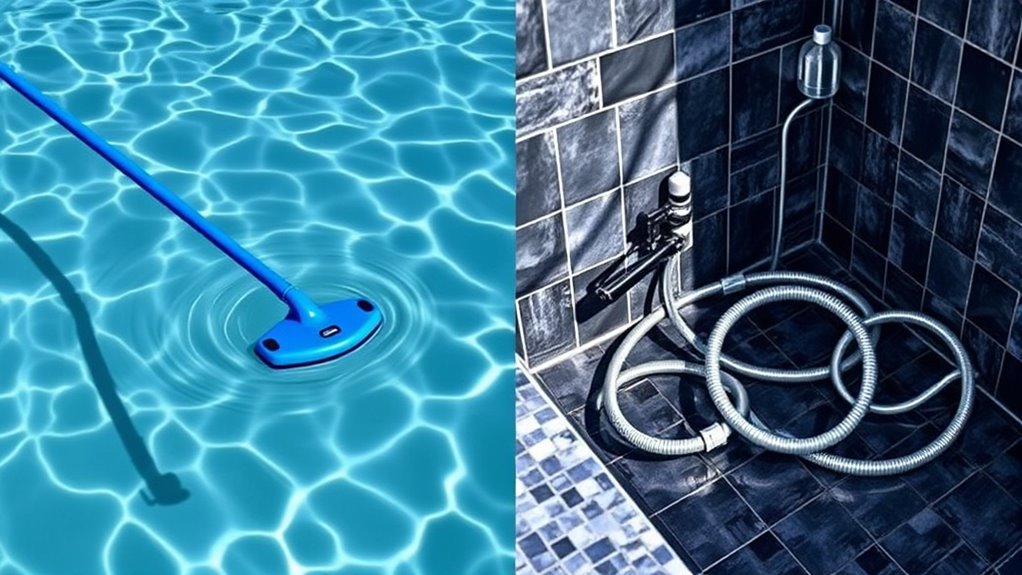
Keeping your suction pool cleaner in top shape can be challenging, but understanding common issues helps. You’ll want to recognize trouble signs early and apply simple troubleshooting techniques. Regular inspection and filter maintenance are essential to prevent clogging and ensure optimal performance. Additionally, monitoring the power source to ensure consistent operation can help avoid unexpected shutdowns or inefficiencies. Recognizing filter replacement intervals and adhering to the manufacturer’s recommended schedule can significantly extend the life of your cleaner. Recognizing airless technology performance patterns related to your pool’s performance can also provide intuitive guidance for maintenance timing and adjustments.
Common Maintenance Challenges
Suction pool cleaners can face several common maintenance challenges that may hinder their performance. One issue is dealing with algae blooms, which can clog the cleaner and reduce suction power. Ensuring proper chemical balancing helps prevent algae growth and keeps the cleaner functioning smoothly. Additionally, debris buildup in the skimmer or pump basket can restrict flow, decreasing efficiency. Other challenges include tangled hoses, which limit movement, and clogged filters that need regular cleaning. To maintain ideal performance, you should:
- Regularly check and clean the skimmer and pump baskets.
- Maintain proper chemical balance to prevent algae and debris accumulation.
- Inspect hoses for tangles or blockages.
- Clean or replace filters as needed to ensure consistent suction and cleaning.
- Using a vetted home theatre projector can enhance your viewing experience while maintaining your pool area.
- Implementing routine inspections of the pool’s filtration system can prevent unexpected breakdowns and improve overall efficiency, especially when addressing issues like clogged filters that directly impact suction power. Regularly monitoring the suction system components, including parts like the pump impeller, can help identify early signs of wear or damage, ensuring longevity and optimal operation.
Troubleshooting Techniques
When your suction pool cleaner isn’t working properly, troubleshooting quickly can save you time and frustration. First, check the pool’s chemical balance; imbalanced chemicals can affect the cleaner’s suction and movement. Confirm the filter basket is clean, as debris can clog the intake. Inspect the hoses for leaks or blockages, which reduce suction power. If you use solar heating, verify that temperature changes haven’t caused debris buildup or algae growth that could hinder the cleaner’s operation. Regularly brush and vacuum the pool to prevent excessive dirt and algae from overwhelming the cleaner. Additionally, confirm the cleaner’s weight and suction settings are appropriate for your pool type. Properly maintaining pool equipment ensures optimal performance and extends the lifespan of your suction pool cleaner. Incorporating routine maintenance and mindfulness techniques into your routine can help you stay patient and focused during troubleshooting, reducing stress and making the process more efficient. Being aware of professional maintenance options can also help address persistent issues effectively. Moreover, understanding how cleaning schedules impact debris accumulation can help prevent future problems and improve overall pool cleanliness.
Cost and Long-Term Performance Implications
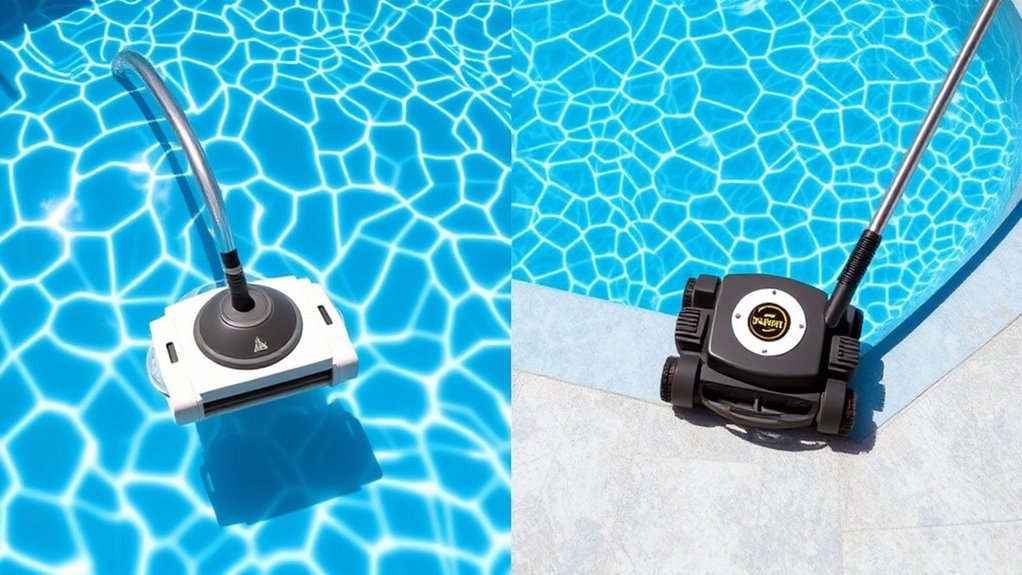
When considering a suction pool cleaner, you should think about both installation and ongoing maintenance costs to see if it fits your budget. Durability and longevity also matter, as a more durable model can save you money over time. Understanding these factors helps you make a smarter, long-term investment in your pool’s cleanliness.
Installation and Maintenance Costs
Installing a suction pool cleaner typically involves a one-time setup cost, which can vary depending on your pool’s size and the complexity of the installation. For in-ground pools, you might need to modify your pool deck or install dedicated skimmer connections, increasing initial expenses. Maintenance costs include regular cleaning of the skimmer and filter, monitoring water chemistry, and occasional parts replacement. To better understand costs:
- Installation fees for connecting the cleaner to your pool’s skimmer or dedicated line
- Labor costs for professional setup, especially for in-ground pools with complex plumbing
- Routine maintenance like cleaning filters and checking hoses
- Water chemistry adjustments to ensure ideal cleaner performance and prevent damage
These factors impact long-term costs and efficiency, influencing your overall investment in the cleaner.
Durability and Longevity
Because suction pool cleaners are designed for long-term use, their durability directly affects your investment’s value. Material durability ensures the cleaner withstands constant exposure to water, chemicals, and debris, reducing replacement costs over time. Wear resistance is essential, as it determines how well the components hold up against friction and abrasion from pool surfaces. Higher-quality materials, like sturdy plastics or corrosion-resistant metals, extend the cleaner’s lifespan and maintain ideal performance. In-ground pool cleaners often face more abrasive surfaces, so durability becomes even more important for long-term reliability. Investing in a model with excellent wear resistance and robust material durability saves you money and hassle, ensuring your cleaner stays effective season after season.
Frequently Asked Questions
Can Suction Pool Cleaners Handle Large Debris in Both Pool Types?
You might find that suction pool cleaners can handle large debris, but their debris capacity varies. In both pool types, cleaning efficiency often drops with bigger debris, especially if the cleaner’s capacity is limited. For pools with lots of large debris, choose a model with a higher debris capacity to guarantee effective cleaning. Regularly emptying the debris chamber helps maintain ideal cleaning efficiency, regardless of pool size.
Are There Any Safety Concerns Using Suction Cleaners in Above-Ground Pools?
Imagine you’re back in the days of dial-up internet—modern safety concerns still matter. When using suction cleaners, you should check your pool surface for stability and guarantee proper electrical safety. Above-ground pools are generally safe, but always inspect for loose fittings or wiring issues. Keep the power cord away from water, and use GFCI outlets to prevent electrical hazards. Safety first, so your fun doesn’t turn into a worry.
How Do Suction Cleaners Affect Pool Water Chemistry Over Time?
Suction cleaners can slightly impact your pool’s water chemistry over time. As they operate, they may affect the water pH balance, making it more acidic or alkaline if not monitored. Additionally, they can influence chemical residuals, potentially reducing sanitizer levels. To keep your water balanced, check pH regularly and adjust chemicals as needed, ensuring your pool remains safe and clean without negative effects from the cleaner.
Can Suction Cleaners Be Used With Pool Covers or Accessories?
Imagine your pool’s cleanliness hanging by a thread! Suction pool cleaners can work with pool covers and accessories, but it’s a tightrope walk. You need to guarantee your pool cover isn’t blocking the cleaner’s suction port or clogging its hose. Some accessories may interfere with operation or cause damage. Always check compatibility before use, so your pool stays pristine without risking damage to your equipment or cover.
What Are the Warranty Options for Suction Pool Cleaners for Each Pool Type?
When considering warranty options for suction pool cleaners, you should check manufacturer policies and warranty coverage details. Typically, warranties vary by brand and model, offering different durations and coverage levels. Some manufacturers provide limited warranties that cover parts and repairs, while others may include full replacements. Always read the warranty terms carefully to understand what’s included, and keep your purchase receipt, as it’s usually required for warranty claims.
Conclusion
Think of choosing a suction pool cleaner like selecting the right key for a lock—you need the perfect fit. Whether you have an above-ground or in-ground pool, understanding their differences helps you make the best choice. With the right cleaner, maintaining your pool becomes a smooth ride, not a bumpy road. Invest wisely, and your pool will shine like a gem, inviting you to enjoy every splash and swim without a hitch.
